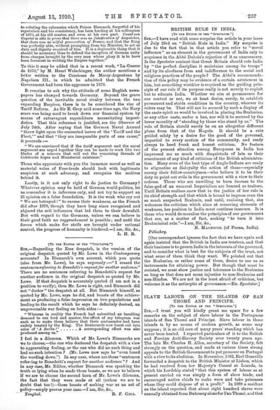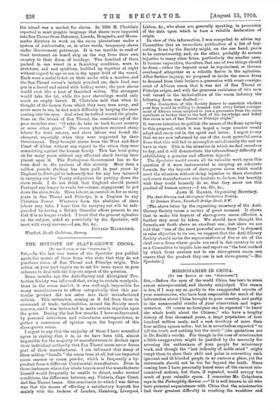SLAVE LABOUR ON THE ISLANDS OF SAN THOMg AND PRINCIPE.
[To THR EDITOR Or TICK Srsarkroa.']
Sin,—I trust you will kindly grant me space for a few remarks on the subject of slave labour in the Portuguese islands of San Thome and Principe. Slave labour in those islands is by no means of modern growth, as some may suppose ; it is an old sore of many years' standing which has never been healed. I reported particulars of it to the British and Foreign Anti-Slavery Society over twenty years ago. The late Mr. Charles H. Allen, secretary of the Society, felt strongly on the question, and made at various times strong appeals to the British Government to put pressure on Portugal with a view to its abolition. In November, 1882, Earl Granville forwarded a despatch to the British Minister at Lisbon; which he had received from her Majesty's Consul at Loanda, in which his Lordship stated "that this system of labour as at present carried on was simply a form of slave trade, and encouraged native chiefs to make wars and take prisoners whom they could dispose of at a profit." In 1889 a resident on the island reported that about eight hundred slaves were annually obtained from Dahomey alonefor Fan Thome. and that
the island was a market for slaves. In 1890 M. Chatelain reported in most graphic language that slaves were imported into San Thome from Dahomey, Loanda, Benguella, and Mona- suedes districts to work on the cocoa plantations under a system of contractados, or, in other words, temporary slaves under Government patronage. It is too terrible to read of their treatment on board ship on the way from their own country to their doom of bondage. Two hundred of them packed in one vessel in a famishing condition, worn to skeletons, sad and spiritless, huddled up together at night without regard to age or sex in the upper hold of the vesseL Each wore a metal ticket on their necks with a number, and the San Thome owner's initials punched on; their food was pnt in a barrel and mixed with boiling water; the poor slaves would rush like a host of famished wolves. The strongest would take the lot, while the poor starvelings would only reach an empty barreL M. Chatelain said that when he thought of the homes from which they were torn away, and never more to see, he had much difficulty in keeping the tears coming into his eyes. And when he walked round the plantae tions on the island of San Thome, the continual cry of the poor wretches was : "0 take, do take us back to our country or some other place." The cocoa planters required cheap labour for their estates, and slave labour was found the cheapest, especially when they were supported by their Government. They brought slaves from the West and East Coast of Africa without any regard to the crime they were committing against the human family. This has been going on for many years without any effectual cheek having been placed upon it. The Portuguese Government has so far been deaf to the protests of this coantry. More than a million pounds sterling has been paid in past years by England to Portugal to indemnify her for any loss incurred in carrying out her Treaty obligations for putting clown the slave trade. I do not think that England should permit Portugal any longer to evade her solemn engagement to put down the slave trade. Slave labour, as carried on for so many years in San Thome and Principe, is a disgrace to any Christian Power. Whatever form the abolition of slave labour may take, I hope that its carrying out will be safe- guarded by having a British Consular officer present to see that it is no longer evaded. I trust that the present agitation on the subject, aided so powerfully by the Spectator, will meet with every success.—I am, Sir, &c.,
Woodcot, South Godstone, Surrey.
DONALD MACKENZIE.







































 Previous page
Previous page